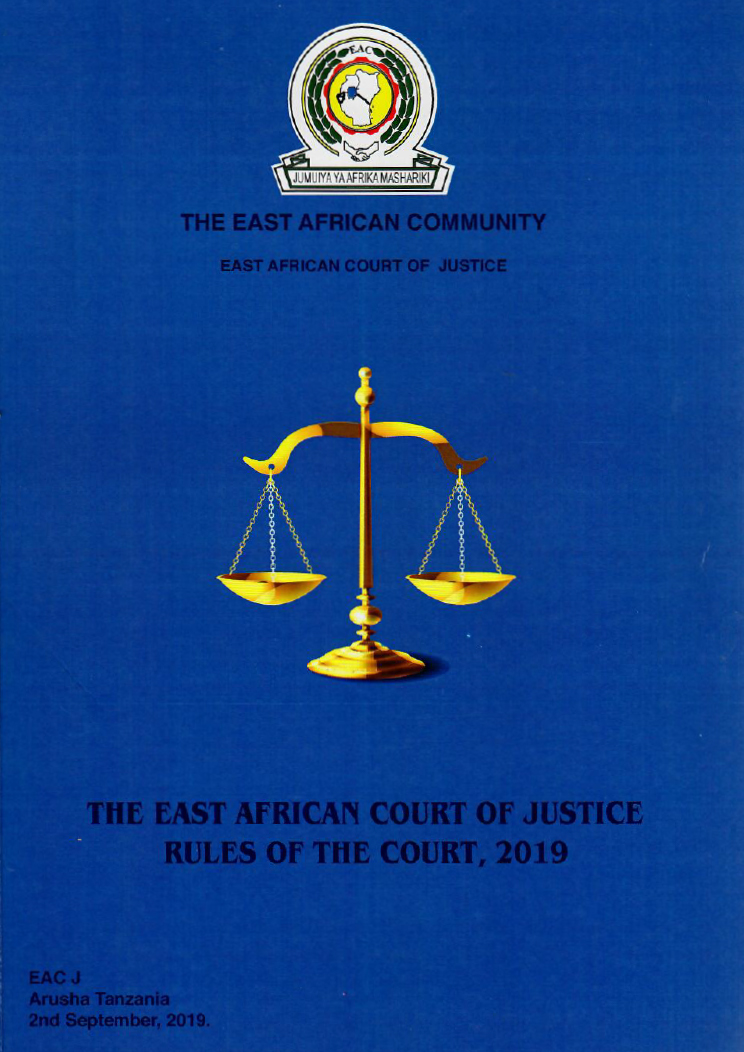1. General
1. The preliminary ruling system is a fundamental mechanism of East African Community Law aimed at enabling national courts to ensure uniform interpretation and application of that law in all the Partner States.
2. The East African Court of Justice has jurisdiction to give preliminary rulings on the interpretation of East African Community law and on the validity of the regulations, directives, decisions or actions of the Community. That general jurisdiction is conferred on it by Article 34 of the Treaty for the Establishment of East African Community (the Treaty).
3. While Article 34 of the Treaty confers on the East African Court of Justice a general jurisdiction, it goes further to direct national courts or tribunals (national courts) to refer a matter to the Court if it considers that a ruling on the question concerning the interpretation or application of the provision of the Treaty is necessary to enable it to give a judgment .
4. The preliminary ruling procedure being based on cooperation between the East African Court of Justice and national courts, it may be helpful, in order to ensure that that cooperation is effective, to provide the national courts with the following information.
5. This practical information is intended to provide guidance to national courts as to whether it is appropriate to make a reference for a preliminary ruling and, should they proceed, to help them formulate and submit questions to the Court.
The role of the East African Court of Justice in the preliminary ruling procedure
1. Under the preliminary ruling procedure, the Court’s role is to give an interpretation of East African Community law or to rule on its validity, not to apply that law to the factual situation underlying the main proceedings, which is the task of the national court. It is not for the Court either to decide issues of fact raised in the main proceedings or to resolve difference of opinion on the interpretation or application of rules of national law.
2. In ruling on the interpretation or validity of East African Community law, the Court makes every effort to give a reply which will be of assistance in resolving the dispute, but it is for the referring court to draw the appropriate conclusions from that reply.
The decision to submit a question to the Court
The originator of the question
1. Under Article 34 of the Treaty, any court of a Partner State, in so far as it is called upon to give a ruling in proceedings intended to arrive at a decision of a judicial nature, may as a rule refer a question to the East African Court of Justice for a preliminary ruling.
2. It is for the national court alone to decide whether to refer a question to the East African Court of Justice for a preliminary ruling. This is so irrespective of whether or not the parties to the main proceedings have requested it to do so.
Reference on interpretation
1. Any court may refer a question to the East African Court of Justice on the interpretation of a rule of East African Community law if it considers it necessary to do so in order to resolve a dispute brought before it.
2. It is for the national court to explain why the interpretation sought is necessary to enable it to give judgment.
Reference on determination of validity
1. Although national courts may reject pleas raised before them challenging the validity of regulations, directives, decisions or actions of the Community, the East African Court of Justice has exclusive jurisdiction to declare such an regulations, directives, decisions or actions invalid.
2. All national courts must therefore refer a question to the Court when they have doubts about the validity of such regulations, directives, decisions or actions, stating the reasons for which they consider that that act may be invalid.
3. However, if a national court has serious doubts about the validity of a regulation, directive, decision or action of the Community on which a national measure is based, it may exceptionally suspend application of that measure temporarily or grant other interim relief with respect to it. It must then refer the question of validity to the East African Court of Justice, stating the reasons for which it considers the act to be invalid.
The stage at which to submit a question for a preliminary ruling
1. A national court or tribunal may refer a question to the Court for a preliminary ruling as soon as it finds that a ruling on the point or points of interpretation or validity is necessary to enable it to give judgment; it is the national court which is in the best position to decide at what stage of the proceedings such a question should be referred.
2. It is, however, desirable that a decision to seek a preliminary ruling should be taken when the national proceedings have reached a stage at which the national court is able to define the factual and legal context of the question, so that the East African Court of Justice has available to it all the information necessary to check, where appropriate, that East African Community law applies to the main proceedings. It may also be in the interests of justice to refer a question for a preliminary ruling only after both sides have been heard.
The form of the reference for a preliminary ruling
1.The decision by which a national court or tribunal refers a question to the East African Court of Justice for a preliminary ruling may be in any form allowed by national law as regards procedural steps. It must however be borne in mind that it is that document which serves as the basis of the proceedings before the Court and that it must therefore contain such information as will enable the latter to give a reply which is of assistance to the national court. Moreover, it is only the actual reference for a preliminary ruling which is notified to the interested persons entitled to submit observations to the Court, in particular the Partner States and Organs and Institutions of the Community. The reference should be in English language.
2. The reference should be drafted simply, clearly and precisely, avoiding superfluous detail.
3. A maximum of about 10 pages is generally sufficient to set out in a proper manner the context of a reference for a preliminary ruling. The order for reference must be succinct but sufficiently complete and must contain all the relevant information to give the Court and the interested persons entitled to submit observations a clear understanding of the factual and legal context of the main proceedings. In particular, the order for reference must:
– include a brief account of the subject-matter of the dispute and the relevant findings of fact, or, at least, set out the factual situation on which the question referred is based;
– set out the tenor of any applicable national provisions and identify, where necessary, the relevant national case-law, giving in each case precise references (for example, a page of an official journal or specific law report, with any internet reference)
– identify the East African Community law provisions relevant to the case as accurately as possible;
– explain the reasons which prompted the national court to raise the question of the interpretation or validity of the East African Community law provisions, and the relationship between those provisions and the national provisions applicable to the main proceedings;
– include, if need be, a summary of the main relevant arguments of the parties to the main proceedings. In order to make it easier to read and refer to the document, it is helpful if the different points or paragraphs of the order for reference are numbered.
4. Finally, the referring court may, if it considers itself able, briefly state its view on the answer to be given to the questions referred for a preliminary ruling.
5. The question or questions themselves should appear in a separate and clearly identified section of the order for reference, generally at the beginning or the end. It must be possible to understand them without referring to the statement of the grounds for the reference, which will however provide the necessary background for a proper assessment.
The effects of the reference for a preliminary ruling on the national proceedings
1. A reference for preliminary ruling calls for the national proceedings to be stayed until the East African Court of Justice has given its ruling.
2. However, the national court may still order protective measures, particularly in connection with a reference on determination of validity (see point 15 above).
Costs and legal aid
1. Preliminary ruling proceedings before the East African Court of Justice are free of charge and the Court does not rule on the costs of the parties to the main proceedings; it is for the national court to rule on those costs.
2. If a party has insufficient means and where it is possible under national rules, the national court may grant that party legal aid to cover the costs, including those of lawyers’ fees, which the party incurs before the Court.
Communication between the national court and the East African Court of Justice
1. The order for reference and the relevant documents (including, where applicable, the case file or a copy of the case file) are to be sent by the national court directly to the East African Court of Justice, by registered post (addressed to the Registrar of the East African Court of Justice or its sub-registries in the partner states).
2. The Court Registry will stay in contact with the national court until a ruling is given, and will send it copies of the procedural documents.
3. The East African Court of Justice will send its ruling to the national court. It would welcome information from the national court on the action taken upon its ruling in the national proceedings and, where appropriate, a copy of the national court’s final decision

TABLE OF CONTENT
The role of the East African Court of Justice in the preliminary ruling procedure
The decision to submit a question to the Court
The stage at which to submit a question for a preliminary ruling
The form of the reference for a preliminary ruling
The effects of the reference for a preliminary ruling on the national proceedings
Communication between the national court and the East African Court of Justice
